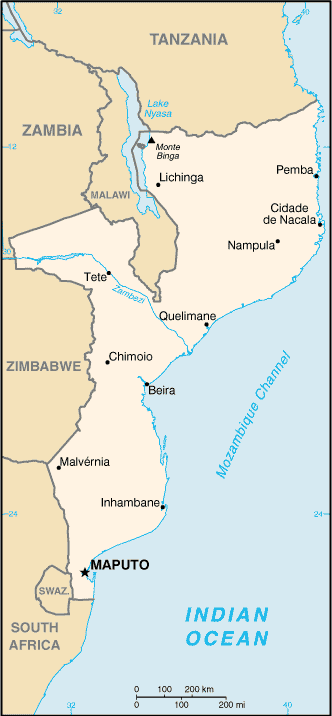Deaf cultures and Sign Languages of the world: Mozambique (Moçambique)
Created 10 April 2000, links updated monthly with the help of LinkAlarm.
 David Bar-Tzur
David Bar-Tzur

Flag: World flag database.
Map: Perry-Castañeda Library Map Collection.
For a quick, interesting resource for facts about this and other countries,
try Mystic Planet - The New Age directory of Planet Earth.
Note: Flag next to a link shows what language the website is in. This is sometimes obvious by what country the link is for or the fact that the title is in English. If I feel it may be ambiguous, I have tried to clarify by using a flag. This is done so that people can read sites in the language of their choice.
 Bullfrog Films. (1999). Celso Magumbe in Mozambique. A film about a deaf man who fights for the rights of the hearing impaired.
Bullfrog Films. (1999). Celso Magumbe in Mozambique. A film about a deaf man who fights for the rights of the hearing impaired.
 Miles, M. (2005). Deaf people living and communication in African histories, c. 960s - 1960s. There is strong documentary evidence that deaf or hearing impaired men and women, girls and boys, did occupy social space and took roles across the full spectrum of life throughout Africa in earlier centuries, living lives like everyone else and also having some different experiences. Traces and signs of deaf people appear in many sorts of historical document, such as travellers' accounts, legal and genealogical records, government, institutional and missionary archives, linguistic studies, literature, folklore, religious narrative, mime, dance and drama. Many of their experiences have involved severe economic poverty and adversity, stigmatising attitudes and exclusionary practices; yet this has not been the norm everywhere in Africa, and many deaf people have shown great resilience, perseverance, humour and ingenuity in their dealings and communications with the non-deaf world.
Miles, M. (2005). Deaf people living and communication in African histories, c. 960s - 1960s. There is strong documentary evidence that deaf or hearing impaired men and women, girls and boys, did occupy social space and took roles across the full spectrum of life throughout Africa in earlier centuries, living lives like everyone else and also having some different experiences. Traces and signs of deaf people appear in many sorts of historical document, such as travellers' accounts, legal and genealogical records, government, institutional and missionary archives, linguistic studies, literature, folklore, religious narrative, mime, dance and drama. Many of their experiences have involved severe economic poverty and adversity, stigmatising attitudes and exclusionary practices; yet this has not been the norm everywhere in Africa, and many deaf people have shown great resilience, perseverance, humour and ingenuity in their dealings and communications with the non-deaf world.
 Mozambican Sign Language: A language of Mozambique.
Mozambican Sign Language: A language of Mozambique.
 Tembe, F. M. (2001, November-December). Research on the Violation of Human Rights of Deaf People in Mozambique.
Tembe, F. M. (2001, November-December). Research on the Violation of Human Rights of Deaf People in Mozambique.

Home
![]() David Bar-Tzur
David Bar-Tzur![]()

 Bullfrog Films. (1999).
Bullfrog Films. (1999). 